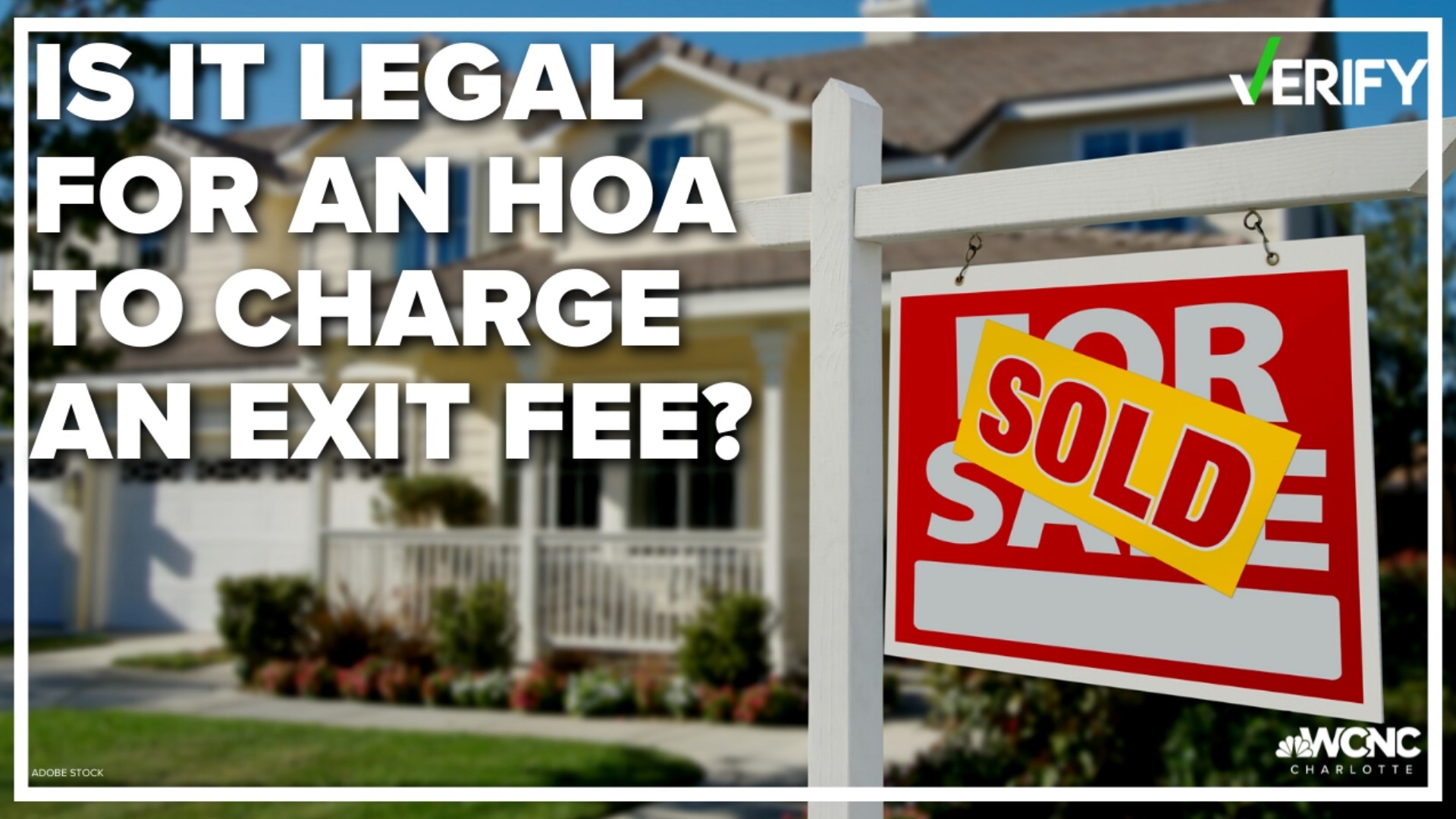CHARLOTTE, N.C. — Imagine you sell your house, but you still need to pay more than a thousand dollars before you leave your neighborhood.
That happened to one Fort Mill woman who had to pay a homeowners association's exit fee.
Isabel Ward told WCNC Charlotte she had to pay $1,712.50 to part ways with her HOA in the Baxter Village community in Fort Mill.
"I never heard of an exit fee for anything, so that’s why I said I was shocked," Ward said.
Ward lived in the community since 2014. When she was closing on the sale of her house a month ago, that's when she got an email.
"When I went to the closing, I said, 'What is this?'" Ward said. "And they told me that’s the fee they charge for leaving Baxter, and I said, 'What do you mean there is a fee?'"
THE QUESTION:
Is it legal for an HOA to charge an exit fee?
OUR SOURCES:
- Attorney Gary Mauney, Partner at Mauney PLLC
- South and North Carolina Realtor David Hoffman, President of David Hoffman Realty
- North and South Carolina Law
- A statement from the Baxter Village HOA Management Company, Kuester Management Group
THE ANSWER:
We can verify that if a community was developed before 2010 in North Carolina or before 2012 in South Carolina, then yes, exit fees our legal.
However, if a community was developed after those years in each respective state, then no, they are not legal.
WHAT WE FOUND:
Right off the bat, Mauney told us in some communities, exit fees are allowed, but in others, it’s illegal. It all depends upon when the neighborhood was established.
"In North Carolina, an HOA formed after 2010 can file their documents at the courthouse after 2010," Mauney said. "From 2010 through right now, these types of transfer fees are not legal."
If a developer built after 2010 in North Carolina, Mauney said these exit fees are forbidden. However, for developments built before that, exit fees are grandfathered in.
"So long as the covenants, the filings to the courthouse of your association were before 2010, you're protected by the legislature through this particular statute and that is in North Carolina," Mauney said.
A similar statute was also enacted in South Carolina in 2012 that prohibits transfer fee covenants. Like North Carolina, if a developer in South Carolina started the development process before 2012, they can continue with those fees.
Ward's community was established in 1998, allowing for these exit fees.
Kuester Management Group sent us this statement:
Section 8.9 (“Community Service Fees”), found within the Declaration of Covenants, Conditions, and Restrictions for Baxter (originally recorded November 6, 1998, the “Declaration”) specifically provides for the collection of a Community Service Fee upon the transfer of ownership. As you will note in your review of Section 8.9, the authority, fee limit, purpose and a list of exempt transfers are clearly laid out for all owners to review. As you know, the Declaration is a matter of public record and is routinely provided to purchasers as part of the title work obtained in connection with their closing. In addition, and in order to ensure all owners have the opportunity to fully understand their obligations within the Association and review important community documents, the Association provides access to the community’s governing documents, including the Declaration, on the community website. The Association also holds new owner welcome meetings periodically throughout the year to provide the opportunity for new owners to better familiarize themselves with the community and present items they may need clarification on. The fee in question is also discussed regularly at quarterly open homeowner meetings held by the Association’s Board.
Substantively, Section 8.9 authorizes the Association to collect a community service fee from the transferring Owner upon each transfer of title to a Unit in Baxter, which fee shall not exceed the greater of $500 or 0.25% of the Gross Selling Price of the Unit. The authorized purposes for the fee are described in Section 8.9(c). Accordingly, the fee is permitted under South Carolina law, including SC Code Section 27-1-70(A)(4)(c).
"What our firm has been doing is we have been asking in advance to the HOA what are the expectations to this seller at closing, and in this market, we have been asking if we can pass it along to the buyer," Hoffman said.
Hoffman sees these fees when clients buy or sell a home that is a part of an HOA community. He told WCNC Charlotte the best thing to do before you buy or sell a home is to ask whether these fees are part of the deal.
"Every homeowner should call their HOA in the coming days and ask if you were to sell your house tomorrow, how much is the fee, what is it called?" Hoffman asked. "When does it get paid?"
Mauney and Hoffman both tell us you should ask questions before signing and have your realtor or a lawyer look over your HOA agreement.
Contact Meghan Bragg at mbragg@wcnc.com and follow her on Facebook, Twitter and Instagram.
VERIFY is dedicated to helping the public distinguish between true and false information. The VERIFY team, with help from questions submitted by the audience, tracks the spread of stories or claims that need clarification or correction. Have something you want VERIFIED? Text us at 704-329-3600 or visit /verify.

